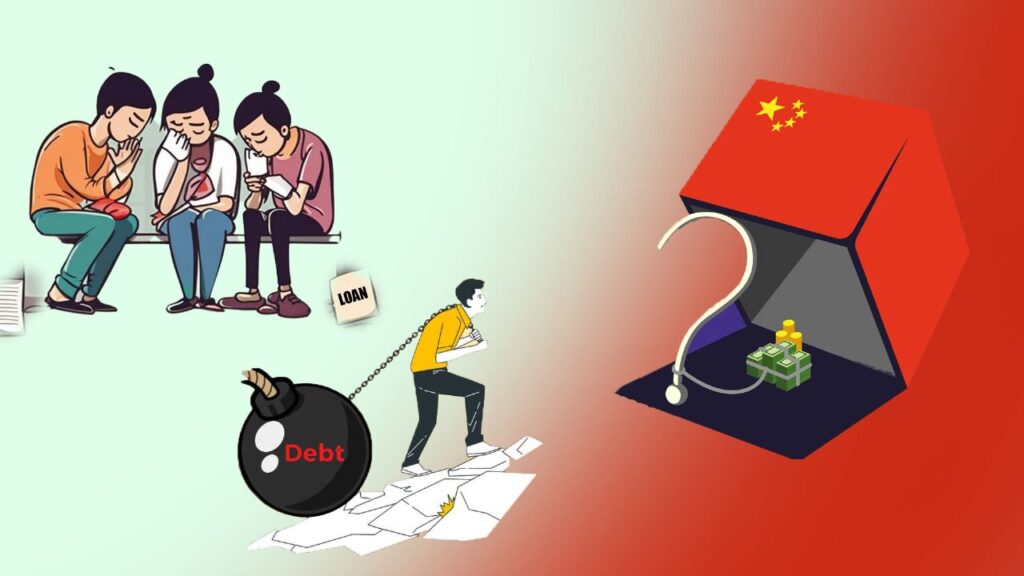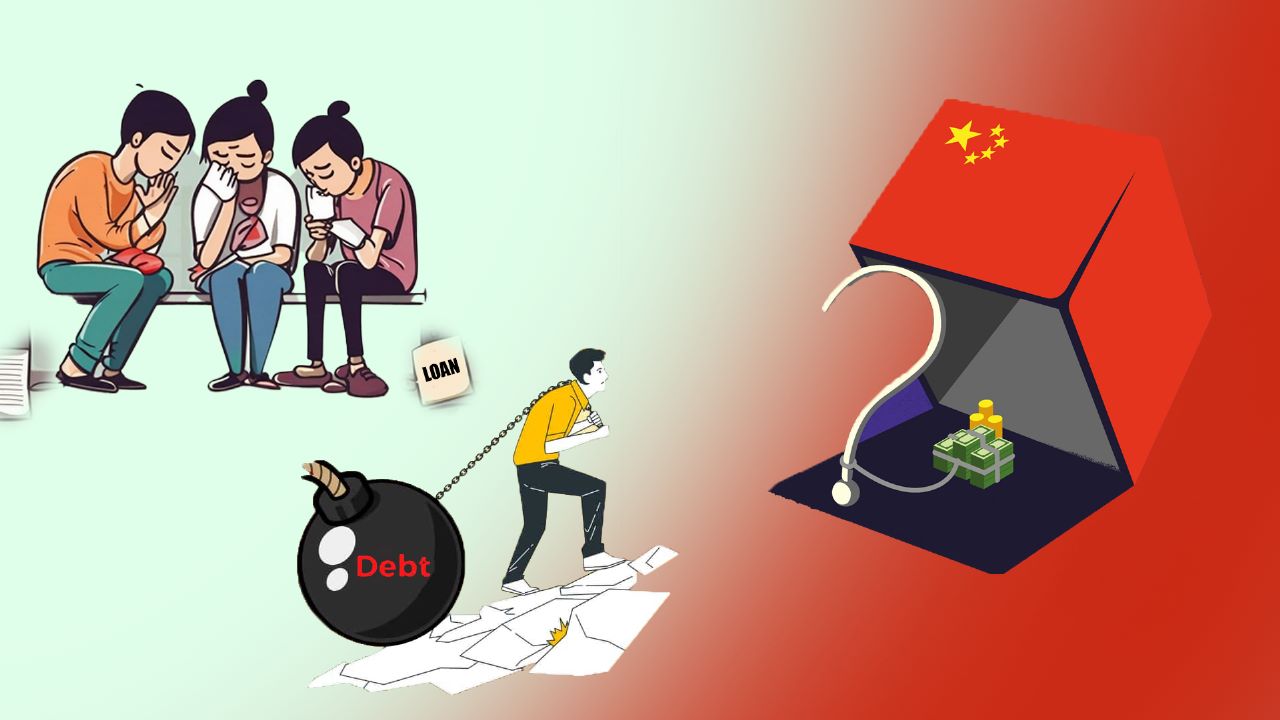
Chinese Loan Apps: A Debt Trap to Death Trap
Rohan
Chinese loan apps, which offer quick loans with minimal paperwork, have become increasingly popular among Indian borrowers. However, these apps have also been associated with incidents involving threats to borrowers and compromising their privacy. One distressing case occurred in Bangalore involving Tejas, a 22-year-old engineering student. Tejas faced severe torture from an agent due to his loan from a Chinese app named Slice and Kiss, which ultimately led to his tragic suicide.

The questionable practices employed by these apps consistently undermine the privacy and security of citizens, while their excessively high-interest rates and lack of regulatory oversight present substantial challenges to the Indian economy. This analysis sheds light on the various aspects of this phenomenon, highlighting the challenges posed by Chinese lending apps in India and emphasizing their potential risks.
Perilous for Indian Citizens
Chinese lending apps expose borrowers\’ personal and financial information to significant risks, potentially leading to severe breaches of privacy. These apps often impose exorbitant interest rates and concealed fees, trapping users in a cycle of debt. Many borrowers, often in urgent need of funds, remain unaware of the predatory lending practices employed, ultimately landing themselves in financial distress.
Moreover, these apps are associated with unethical and aggressive debt-collection tactics. Borrowers who fail to make timely payments or encounter financial hardships often face harassment, intimidation, and public humiliation from collection agencies. Such practices can have profound psychological and emotional consequences, driving vulnerable individuals to despair and, tragically, even suicide.
Furthermore, inadequate regulatory oversight and accountability for these apps amplify their risks. With inadequate scrutiny, these apps operate with impunity, exploiting the financial vulnerabilities of Indian citizens without facing appropriate consequences.
Numerous reports have surfaced regarding representatives of these applications resorting to intimidation, harassment, and threats towards borrowers. Particularly during the Covid-19 lockdown, borrowers facing financial difficulties due to the pandemic have reported terrifying experiences, alleging they were subjected to coercive tactics regarding their debts. These threats often take the form of deceitful letters resembling official documents or the harassment of borrowers\’ relatives.
These networks facilitating fraudulent instant loans extend beyond Indian citizens, as Chinese youths and students have fallen victim to this practice. China witnessed a wave of incidents related to \”loans for nudes,\” where numerous cases emerged involving young female college students being coerced into providing explicit photos as collateral to ensure repayment to loan sharks. These instances shed light on China\’s pervasive underground banking scandal, exposing the murky realm of loan sharks. The cases exemplify China\’s growing consumerism, underdeveloped financial system, and lack of a comprehensive student loan program.
The Chinese Underground Banking Scandal
The Chinese Underground Banking Scandal sheds light on a disturbing reality that lies beneath the veneer of the financial system. This issue revolves around illicit financial operations conducted outside the purview of established banking institutions, operating clandestinely and evading regulatory oversight.
An essential aspect of this scandal is the pervasive presence of underground banks operating as unlicensed and unregulated financial intermediaries. These clandestine institutions play a significant role in facilitating a wide range of illicit activities, such as money laundering, human trafficking, capital flight, tax evasion, and the financing of unlawful transactions. The scandal\’s dark reality is characterized by exploiting economic loopholes and manipulating financial regulations. With inadequate regulation and enforcement, underground financial networks flourish, enabling criminals to clandestinely transfer substantial amounts of money across borders, obscuring these funds\’ origins and actual purposes.
Moreover, the Underground Banking Scandal carries global implications, involving transnational networks engaged in illicit financial transactions. These networks contribute to the challenges faced by international efforts to combat money laundering, terrorism financing, and other forms of transnational crimes.
It is important to note that not all Chinese loan applications are directly involved with underground banking, and vice versa. However, an interconnectedness can occur when funds originating from loan applications enter the underground banking system. In such cases, underground banking networks may exploit or utilize loan application activities for illicit purposes, including money flows, money laundering, cross-border transactions, and regulatory challenges.
Data Privacy and Security Concerns
The rapid proliferation of Chinese loan applications in India has prompted severe data privacy and security concerns. These apps often demand extensive access to personal information, posing threats to users.
The loan apps often necessitate comprehensive access to users\’ personal information, such as complete names, addresses, phone numbers, social media profiles, bank account details, and even access to the user\’s smartphone contacts. The sheer volume and sensitivity of the data collected endanger individuals\’ privacy and raise the possibility of it being abused for unauthorised objectives.
There have been reports and allegations that certain Chinese lending applications have been involved in misusing and manipulating user data. Data breaches and unlawful sharing of personal information with third parties have been reported. Such activities violate users\’ privacy and raise the risk of identity theft, financial fraud, and other forms of cybercrime.
As Chinese lending apps are international, cross-border data transfers are possible. User data acquired by these apps in India may be transferred and stored on servers outside India, often in China. This adds to the difficulties of data protection because different jurisdictions may have different data privacy laws and regulations.
The Chinese government\’s vast access and control over data raise concerns regarding the privacy and security of user data obtained by Chinese loan apps. Users could be subjected to unlawful access or surveillance by foreign entities. The data privacy and security concerns stemming from these loan apps in India are significant issue that demands immediate attention.
The Indian government has been actively enhancing data protection and privacy laws to safeguard user information from unauthorized access or misuse. The Personal Data Protection Bill, currently under review, seeks to establish comprehensive regulations and mechanisms for protecting personal data, including stringent obligations on data handling, storage, and consent.
Indian Government Actions
Recognizing the potential risks involved with Chinese loan apps, authorities have taken steps to protect customers, maintain financial stability, and limit the illegal operations of these platforms. The Indian government has banned 138 betting applications and 94 loan apps for operating unlawfully or participating in unfair activities. These bans protect Indian borrowers\’ financial interests by preventing further exploitation.
The Ministry of Electronics and Information Technology of India has worked with major app stores like Google Play Store and Apple App Store to detect and remove Chinese lending apps from their platforms.
Law enforcement agencies such as Cyber Crime Cells, the Reserve Bank of India (RBI), and the Enforcement Directorate (ED) have all initiated investigations into the operations of illegal Chinese loan apps. The agencies raided hundreds of payment gateways managed by Chinese individuals and banned many such applications.
The Indian government has demonstrated its commitment to protecting consumers and maintaining financial stability by taking various actions against illegal Chinese loan apps. Continued vigilance, collaboration, and awareness are crucial to effectively address this issue and ensure India\’s safe and secure digital lending ecosystem.
(Author is operations manager at Centre for Integrated and Holistic Studies, non-partisan think tank based in New Delhi)

